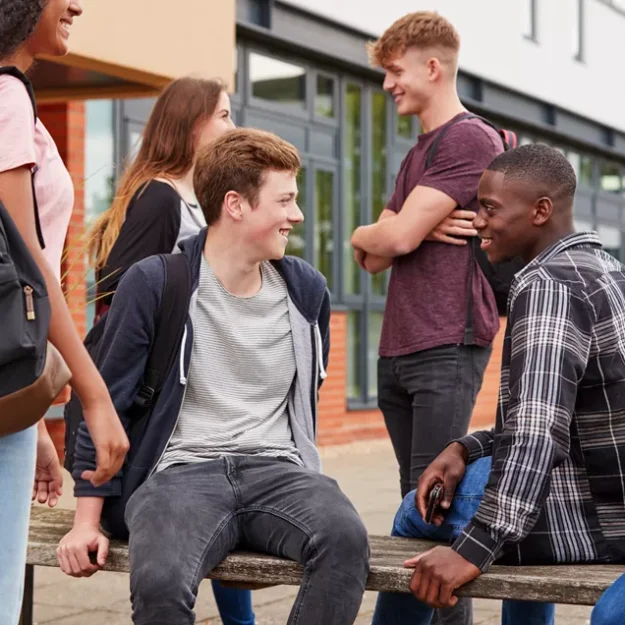Support &
Independence
Leaving Care Solutions delivers a personalised Preparation for Independence programme to all young people within our supported accommodation or receiving floating support. Personalised support planning identifies areas where young people will benefit most, ensuring individual plans are appropriate and targeted.
Independent Living Journey
Our structured, strengths-based ‘Independent Living Journey’ teaches independent living skills and records progress in a bespoke workbook that young people co-produce. Young people can choose to work towards AQA accreditation, which provides valuable, recognisable qualifications evidencing their skillset as well as providing a sense of achievement.
Personalised support planning identifies areas where young people will benefit most, ensuring individual plans are appropriate and targeted. As young people’s needs change, the plan is updated to reflect the changes.
We work with partners to achieve positive outcomes for young people, as agreed with relevant professionals including Social Workers, Leaving Care teams and CAMHS. We address any issues affecting individuals within Action Plans, often including referrals to other agencies (e.g. CAMHS or substance misuse services).
Topics covered during the ‘Independent Living Journey’ include:
- Hopes and aspirations
- Money management, including budgeting, bank accounts, bills and benefits
- Health and wellbeing, such as doctor and dentist registrations, smoking, drugs and alcohol
- Cooking, diet, nutrition and exercise
- Mental health and wellbeing, including resilience and how to find help
- Healthy relationships and sexual health
- Healthy relationships with family and friends, and sources of support
- Education, employment and training
- Accommodation, including types of tenancies, DIY and cleaning
- Self-care, personal hygiene and staying safe in person and online
- Travelling and public transport.

Employment, Education or Training
A vital element of the programme is addressing young people’s involvement in education, employment or training. Our teams are familiar with local education and employment services, including those for individuals with complex needs. We will work alongside local employment, education and training providers and support services.
We explore options for each young person and support them to be aspirational. We take young people to college and university open days, teach interview skills and support with writing CVs and applications. We show young people where to seek local employment opportunities; for example, Jobcentre Plus and local recruitment agencies. We also support young people to travel independently to their place of study or employment; for example, by helping identify appropriate bus routes and travelling with them until they are confident to travel independently.

Transitions
When young people approach independence, we work closely with the placing authority to assess their abilities and ensure Action Plans provide appropriate support for transitions. Key actions include:
- Six months before a young person’s 18th birthday, we support them with applications for social or council housing
- At the same stage, we support young people to prepare applications for relevant benefits (e.g. JSA, Universal Credit, Housing Benefit, PIP etc)
- We evaluate young people’s independence skills and their ability to live successfully within a community; our ongoing evaluation of independence skills and use of Outcomes Stars™ during placement informs this assessment.
Our teams are well-informed about local housing options and will help young people register for council housing so they can access the East London Lettings Company’s services. We explain options such as private rented or social housing during their ‘Independent Living Journey’ and we ensure post-18 expectations are realistic.
We help young people secure tenancies and ensure sustainable support is in place before they leave us, including access to universal services and the means of seeking specialist support.
Participation
We encourage participation in community activities, enabling young people to develop strong support networks and relationships so they move into a well-known community where independence can be nurtured.
Reunification
When reunification with families is the intended outcome, we follow a Restorative Approach focussed on rebuilding and managing relationships, with therapeutic input from CAMHS during placement. Should a young person turn 18 during this stage, we work with partners to manage the transition to adult services.
Moving On Plans
When young people leave us, we conduct comprehensive exit interviews and share their Moving On Plans with relevant agencies. We recognise the benefits of Staying Close arrangements (originally proposed by Sir Martin Narey’s review of services for looked-after children, to which our organisation contributed), and maintain contact with young people by never ‘closing the door’.
Keyworker allocation
When a young person is referred to us, we take the time to get to know them, including likes/dislikes, interests, what they enjoy doing, and hopes and aspirations. This allows us to tailor their individual support plan, to include engaging in community activities they will enjoy (e.g. sports, outdoor pursuits, music) and steps towards career goals that will achieve a happy and fulfilling future (e.g. accessing an apprenticeship, work experience or training course).
Every young person has an allocated keyworker, who builds a trusting, positive relationship with the young person and maintains regular contact with them, so the young person can share any issues or concerns. Furthermore, our staff are skilled in observing changes in a young person’s behaviour, so even if they do not verbalise their concerns we can identify potential signs that something may be wrong and explore this with the young person.
Adverse Childhood Experiences & Trauma Informed Approach
Our staff are trained in Adverse Childhood Experiences and a Trauma Informed Approach, which underpins our service delivery. They recognise the impact of past traumas on a young person’s emotional wellbeing and are trained in therapeutic models of working with young people. We discuss with the young person any need they may have for additional mental health support, and help them to access local services and/or online resources to promote their mental health and emotional wellbeing.

Young People’s Views
LCS uses a range of innovative, proven techniques to engage young people in the design and delivery of individual support and overall service development.

Accommodation
At LCS, we will only place young people in accommodation that we and our family would be happy to live in.

Safeguarding
LCS implements Safer Recruitment practices which ensure all staff are appropriately qualified and experienced to deliver a safe, high quality service.